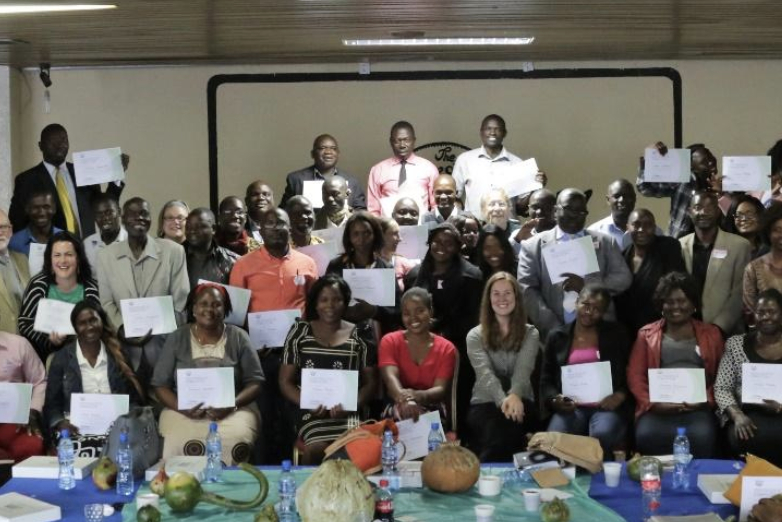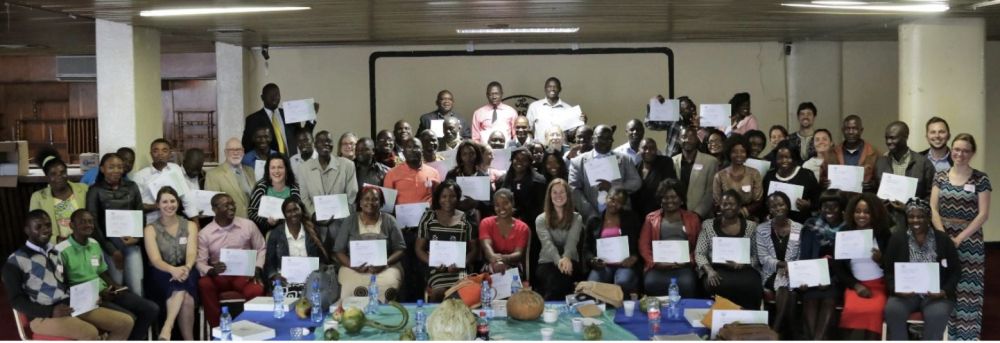Last year, Rotary Clubs from District 7630 including Christiana Rotary, Newark Morning Club, Centerville Rotary Club, Kent Island Rotary Club and Chestertown Rotary Club all came together to support a global initiative between Chestertown Rotary and Rotary of Lusaka Central in Zambia, Central Africa.
This project was to make a drug and alcohol counseling curriculum, “Literacy-Free 12 Step Expressive Arts Therapy” and training accessible to Zambian-led organizations reaching out to homeless youth and wanting to help substance users.
In Lusaka, Zambia, an estimated 30,000 youth live on the streets, vulnerable to substance use (U.S. Dept of Labor Bureau of International Labor Affairs, 2005). One quarter of these youth admit to using substances. Most popular are marijuana and inhalants like glue and gasoline (Lemba, 2002. Actual numbers of substance users are believed to be underreported due to stigma and lack of care (Matheson, 1999; Smith, 2011). Recently, Zambia’s Ministry of Health has been working on an alcohol policy aimed to regulate alcohol consumption; and suggested that the country’s mental health hospital, Chainama Hills, will be offering intensive rehabilitation for people with alcohol abuse to seek recovery (Maninga, 2017). The Ministry of Health and Chainama Hills College Hospital also made strides to recognize treatment for drug and alcohol use as a priority by endorsing the training in the “Literacy-Free 12 Step Expressive Arts Therapy” curriculum last year.
The training took place in June 2018 and the grant’s activities and follow up data collection finished earlier this month, though the effect will be felt for years to come. 36 Zambian-led organizations total were trained for free in the “Literacy-Free 12 Step Expressive Arts Therapy” curriculum in the cities of Lusaka and Ndola. It is a literacy-free group counseling manual that uses cognitive behavioral and rational emotive behavior therapy techniques. It guides participants through the 12 Step principles for overcoming addiction as well as related psychoeducational topics. All these techniques of coping with addiction are explored and applied through expressive arts activities specific to Zambian culture.
Curriculum trainers were from CoLaborers International, an eastern shore based non-profit organization that produces the curriculum. Training in a US version of this same curriculum is endorsed by Maryland’s Board of Professional Counselors and Therapists for continuing education and is used at facilities across the state of MD.
Trainers for this project included Melissa Stuebing, MA,CAC-AD curriculum author and counselor, Jason Stansbury who has served street children for 3 years at Chisomo Centers in Lusaka, Zambia, Allyson Olkowski Arnold who ran a year-long study of the curriculum in Zambia, Hjordis Lorenz who was a part of both the US and Zambia studies of the curriculum, Michael Peck, CSC-AD a drug and alcohol counselor for 20 years in the US with experience in Zambia and Chipo Pepe Nambeye who ran previously curriculum groups at for 2 years.
David White represented the Chestertown, MD Rotary Club and shared about the foundation and Rotary’s Disease Prevention area of focus. Rev. Aaron and Josephine Chilunjika from Chisomo Centers, the Zambian organization where initial studies of the curriculum took place, shared about previous their experience of the curriculum at their facility and the impact it had on the street children they help. They gave inspiring accounts of lives changed, children coming off drugs, going back to school and being reintegrated into families.
The training lasted 2 days, learning the 11 lessons offered in the curriculum. While many of the organizations attending were already reaching out to substance dependent populations in non-therapeutic ways – food, mentoring, bible studies, clothing, education, etc… – they lacked therapeutic tools which this training offered.
The follow up over the past year has found that offering the “Literacy-Free 12 Step Expressive Arts Therapy” groups across Zambia produced statistically significant benefits. Clients significantly decreased substance use in marijuana, alcohol, cigarettes and inhalants (such as bostic and sticker). Not only that, this intervention has powerful implications in combating stigma as it was found to significantly increase both open sharing by clients in a group setting as well as their personal motivation to change.
Louis Mwewa of Zambian Association of Child Care Workers helps substance users in his community. He described running these curriculum groups as “a very uplifting process which was able stimulate the inner being shattered by the previous experience of life”.
Mildred Zimba engages with young addicts through a Zambian organization called Blessed to Bless. She felt groups provided her clients with “preparation for a future responsible true self by avoiding drugs or, if on drugs, realizing there is room for a better person tomorrow through the program”.
As the follow up continues, the message is loud and clear that there is a value in offering treatment for substance users in Zambia. This curriculum is at the forefront of filling this gap and working towards getting people off drugs, staying drug free, and shattering the stigma. With treatments like this becoming more accessible in Zambia, there is hope for recovery from drugs and alcohol.
For more information about the curriculum, check out www.CoLaborers.com/ExpressiveArts. For more information about how you can get involved in your community through Rotary, check out www.rotary7630.org/ to find a club near you.
REFERENCES –
Lemba M. (2002). Rapid Assessment of Street Children in Lusaka. Lusaka: Project Concern International Zambia.
Lusaka Times. DEC constructing drug addicts rehabilitation centre. (2011, April 11). Retrieved December 3, 2014, from https://www.lusakatimes.com/2011/04/11/dec-constructing-drug-addicts-rehabilitation-centre/
Matheson, I. (1999, July 30). Children high on sewage. Retrieved November 14, 2014, from https://news.bbc.co.uk/2/hi/africa/406067.stm
Maninga, M. (2017, October 11). Zambia battles with alcohol abuse. Zambia Daily Mail. Retrieved from https://www.daily-mail.co.zm/zambia-battles-with-alcohol-abuse/
U.S. Dept of Labor Bureau of International Labor Affairs. (2005). The Department of Labor’s 2004 Findings on the Worst Forms of Child Labor. Retrieved January 17, 2011 from https://www.dol.gov/ilab/media/reports/iclp/tda2004/zambia.htm




Write a Letter to the Editor on this Article
We encourage readers to offer their point of view on this article by submitting the following form. Editing is sometimes necessary and is done at the discretion of the editorial staff.